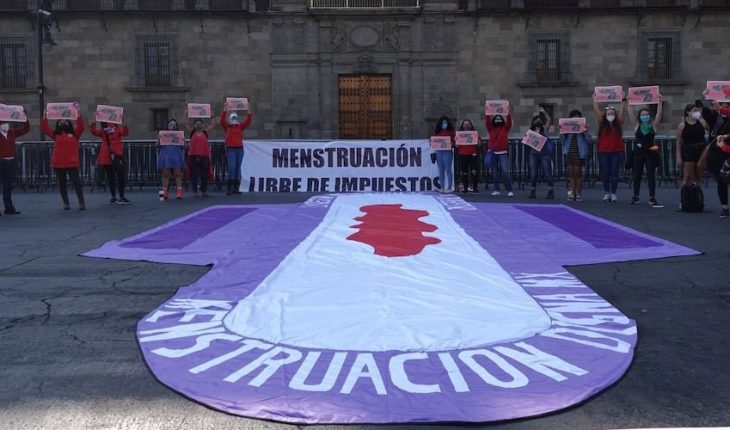Due to taboo or ignorance, menstruation has been left out of the design of any public policy for the benefit -specifically- of women deprived of their liberty who, faced with the impossibility of accessing sanitary napkins or some other products, manage their menstruation using toilet paper, socks, pieces of cloth and more recently masks.
“It is the responsibility of the (penitentiary) center. First, because I am here and they have not told me if I am guilty or innocent and I have to be here instead of being in my house and, secondly, if they have you here, they have to give you the minimum things so that you are well: water, sanitary napkins, soap …”.
“I say that the government should help us, even if it is with that … with bath soap, a personal hygiene kit… it’s the most essential thing.”
These are some of the testimonies that are part of the Diagnosis on the management of the menstrual process of menstruating people and women deprived of liberty in Mexico City, a work carried out jointly by the collective Mujeres Unidas x la Libertad and the Council to Prevent and Eliminate Discrimination of Mexico City (Copred) in order to identify the problems faced by women deprived of their liberty. when it comes to managing your menstruation.
Problems that, we will see later, are not limited to access to sanitary napkins, mainly, but to services as basic as that there is water in the bathrooms and drinking water for them to shower.
“Our menstruation must be dignified anywhere”
In Mexico City there are 13 prisons, two of them are exclusively for women: Santa Martha Acatitla and Tepepan. With a cut to March 2021 in these two spaces there were 1,563 women deprived of liberty, that is, 5.8% of the prison population of the capital of the country.
Although they represent the minority with respect to the more than 25,000 men imprisoned, they are the ones who live in greater proportion the abandonment of their families, which , among other consequences – makes it impossible for them to access food, clothing, hygiene items (including sanitary napkins) or at least, to have some pesos to buy these products inside prison.
“Women in prison have always been abandoned by their families and by the state. 65% of women deprived of their liberty do not have a visit,” says Beatriz Maldonado, general director of the collective Mujeres Unidas x la Libertad.
This statistic, he details, was had before the COVID-19 pandemic so he considers that during 2019 and 2020, during which time visits were limited as part of the contagion prevention policy, this percentage would have increased considerably.
“Women are the four seasons of the year and our menstruation must be dignified anywhere. The treatment of women deprived of their liberty is inhumane,” she adds.
To carry out this diagnosis, 95 women deprived of their liberty who met the characteristics of the sample were interviewed: they were between 18 and 49 years old and had been in prison for at least one year.
The average cost of a sanitary pad is 2 to 3 pesos, however, inside prison – and given the constant refusal of the prison system authorities to deliver these products for free – women must pay up to 10 pesos for a single towel, resources that in most cases they do not have.
Given this panorama, the inmates have been looking for options to live their menstruation in the best way, and this is described by some of the interviewees who participated in this diagnosis.
“There are comrades who I know have worn socks because they don’t have anything… they are the ones who have no visitors.”
“Yes, then… they use as pieces of cloth, something like that… because many have no visitors.”
“Some use paper and if they don’t have it, they cut the shirt and put it on.”
In total, 52 of the 95 women interviewed considered that it is the responsibility of the institution and the government to provide them with menstrual hygiene products.
According to the diagnosis, both in Santa Martha and Tepepan the authorities deliver sanitary napkins – or some other type of menstrual management product – only when they receive donations from individuals. That is, there is no permanent availability of these products, so either they use toilet paper or pieces of cloth, or exchange some of their few belongings with their companions to access them.
The menstrual cup is the option, but…
Friendly not only to the environment, but to the pocket, the menstrual cup could be the best option for women deprived of their liberty to manage their menstruation, however, in most of the time there is no drinking water in the prisons that guarantees that these containers will be kept clean for use.
“This is an issue that nobody cares about and the State is responsible for providing women who are deprived of their liberty with basic supplies and menstrual hygiene,” said Adriana Leyva, executive coordinator of the collective Mujeres Unidas x la Libertad.
The women interviewed for this diagnosis reported that, for example, in the Santa Martha Acatitla penitentiary center, the water they use is not drinkable because it is stored in cisterns and regularly stagnates. Sometimes its color is not light, but rather black or tamarind. In addition to quality, scarcity is an important issue because there is no availability throughout the day, which limits the hygiene needed to wash and change products.
Even showers commonly do not work, so they must use boats to collect the water.
In the case of Tepepan, the general services work better. The water, for example, although it is available a couple of hours a day, is of better quality than in Santa Martha and this affects that women do not have so many difficulties to clean themselves.
“There is no drinking water, there are no showers, there are no containers to throw in towels or compresses (…) they enter the bathrooms and there are bad smells. They are not hygienic,” explained Camila González, a member of the collective.
A dignified menstrual management includes the satisfaction and comfort of menstruating people and cramping is one of the main symptoms that affect most menstruating. In this regard, the interviewees said that when they go to the medical service of the centers to ask for a pill against pain, they are denied “because they are ‘normal’ pains associated with menstruation.”
“They have become accustomed to having a lifestyle that is not dignified and that is not right because there is much more neglect and increases the risk that there are more things that are handled incorrectly,” González reproached.
Menstruation as public policy
The findings presented in this diagnosis are not exclusive to Mexico City, as it is a situation that urgently needs to be addressed in its entirety by the different governments.
Even the National Human Rights Commission (CNDH) itself issued last September recommendation 35/2021 in which it requests the governors of the country to include in the next draft budget a proposal to allocate to the prison authorities the specific resource for the acquisition of sufficient menstrual management elements, “in order to be endowed or continue to be provided with such products free of charge, monthly or when necessary to all inmates on an equal basis and without discrimination; these supplies will also be available to women who access visits in prisons.”
And it is that during several visits made by personnel of the National Diagnosis of Penitentiary Supervision (DNSP) to the penitentiary centers of the country that house women, it was observed in a generalized way that there is restriction and difficulty for access to female towels, and in most of them access and sufficient supply of these is not guaranteed.
In addition, the prison authorities themselves – from different states – recognize that there is no budget item to acquire menstrual belongings, so for the majority what is received in donations is distributed and / or it is the relatives who have to obtain them.
In fact, the invisibility of the needs of menstruating women was evident during the presentation of the diagnosis when the representative of the Penitentiary System of the City when Magali Morales warned that not only the women of Santa Martha and Tepepan should be attended, but also those who are referred to the Center for Administrative Sanctions, better known as “El Torito” where men and women spend between 20 and 36 hours when they have committed an administrative offense or, for example, did not pass the breathalyzer test.
“I just realized that we ignored that center,” the official acknowledged.
Providing products such as sanitary napkins, toilet paper, intimate soaps, drinking water and medical service, is the main recommendation that is made from what is observed in the results of the diagnosis.
Therefore, they called on the authorities to allocate a specific budget to manage the menstruation of women deprived of their liberty.
Likewise, it must be ensured that the conditions of the bathrooms are adequateThey become personal and intimate spaces in which the care of the menstrual cycle must be attended. To do this, there must be availability of drinking water without limitations, showers and showers must work in their entirety and compartments must be available to dispose of the products used during menstruation.
On October 26, within the approval of the Fiscal Miscellaneous 2022, the Senate of the Republic gave the yes to the rate of 0% VAT on menstrual management products, and although it is true that it is a step of utmost importance in the country, there are still urgent pending to attend, for example, how to ensure that these products reach all women, especially those who are deprived of their liberty.
For this reason, the collective #MenstruaciónDignaMéxico – promoters of the 0% VAT rate on menstrual management products – have spoken out for the gratuity of these products, mainly for groups of women historically discriminated against.
“We urge the Mexican government to continue working in favor of girls, adolescents, women and other menstruating people to approve the gratuity of menstrual management products for historically discriminated groups and to promote public policies with a gender perspective that reduce inequalities to guarantee the human right to a dignified menstruation,” the collective said in a statement after the approval of the 0% VAT rate on menstrual management products. by the Congress of the Union.
What we do at Animal Político requires professional journalists, teamwork, dialogue with readers and something very important: independence. You can help us keep going. Be part of the team.
Subscribe to Animal Político, receive benefits and support free journalism.#YoSoyAnimal





